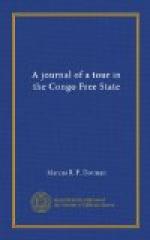There was plenty of time to arrange the impressions of the tour in order and to formulate some general ideas on the system of Government in the Congo and the manner in which it is administered. The whole system has been created and is controlled absolutely by one mind. It is a very simple and extremely practical machine, but it is very vast. The officials who work it therefore, have each their own special task allotted to them and very few appear to understand the principles on which the whole moves. The problem which has been faced and successfully overcome, is how an unknown land populated by savages can be developed and civilised by its own resources without heavily taxing the native and without poisoning him with alcohol.
It is done in this manner. Each native is compelled to do a certain amount of work for the State. This results in the collection of great quantities of rubber and ivory for which the native is paid. The rubber and ivory are then sold at a profit in Europe and the sum so realised is used to pay the heavy expenses of transport, to keep up the Government and to open out new lines of communication throughout the country. The native is thus made to work instead of paying a tax in money and it is possible to raise enough revenue without selling him alcohol.
As has been shown in these pages, the native is very grasping and very idle and has little idea at present of the value either of produce or work. He thus charges an extortionate amount for his goats and chickens, and demands heavy fees for services rendered. The State however, fixes the price of labour and food at its fair value and demands a certain amount of one or other from each village. This sometimes leads to discontent and rebellion just as do the taxes levied by other Governments, and it is necessary to occupy territory with troops. No soldier however, is allowed to have in his possession a rifle unless he is accompanied by a white officer, and if he tries to ill-treat the natives, is severely punished.
The officials themselves, are subjected to the most severe discipline, and as they exist, so to speak, on the rungs of a ladder, each one can be punished by the one next above him, who is, in turn, responsible, until at length the summit is reached. Every Post is worked on identical principles and the responsibility for its success or failure, rests with the official in charge. He is not permitted to try experiments or to alter the system in the least degree, and can only use his moral power to influence the natives. The question has been asked whether this system is not contrary to the letter or spirit of the Treaty of 1885. Clause V. of that treaty runs as follows. “No Power which exercises or may exercise sovereign rights in the above mentioned regions shall be allowed to grant therein either monopoly or privilege of any kind in commercial matters; foreigners without distinction shall enjoy protection of their persons and goods as well as the right of acquiring and transferring moveable and immoveable property and the same treatment and rights as subjects of the nation in the exercise of their professions.”




